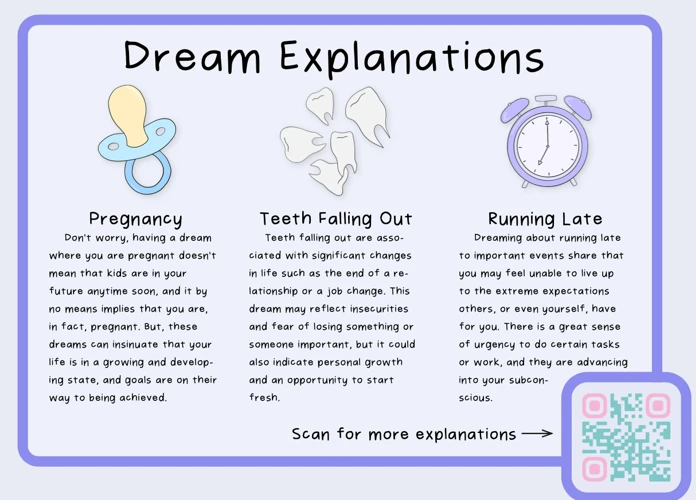Have you ever had a dream where you find yourself frantically searching for something you’ve lost? It’s a common theme in dreams, and it can leave us feeling unsettled and confused upon waking up. But what does it really mean to lose things in our dreams? Is there a deeper significance behind these scenarios? In this article, we will delve into the symbolic meaning behind losing things in dreams and explore how to interpret these experiences. Whether it’s losing keys, money, or even a loved one, we’ll uncover the possible interpretations and provide practical methods to overcome the fear of loss. So, let’s embark on this journey of dream analysis and discover the hidden messages that may lie within the act of losing things in our dreams.
What Does Losing Things in Dreams Symbolize?

Losing things in dreams often symbolizes our deep-seated fear of loss. It can represent a fear of losing something or someone valuable in our waking life. This fear may stem from a sense of attachment or dependency on these things or individuals. The dream reflects our anxiety and apprehension about the potential consequences of losing them.
Dreaming of losing things can also point to feelings of insecurity and vulnerability. It may indicate a lack of confidence in ourselves or our abilities to hold onto what we consider important. The dream may be highlighting our fear of being inadequate or incapable of maintaining control over our lives.
When we dream of losing things, it can symbolize a perceived lack of control in various aspects of our life. It may indicate a sense of powerlessness or an inability to influence the outcome of certain situations. This loss in the dream reflects our internal struggle to regain a sense of control or stability.
In exploring the symbolic meaning behind losing things in dreams, it’s crucial to consider the specific items or individuals lost and the emotions experienced during the dream. Let’s dive deeper into common things lost in dreams and their interpretations to gain a better understanding.
1. The Fear of Loss
The fear of loss is a common interpretation when we lose things in our dreams. It represents our underlying anxieties about losing something or someone valuable in our waking life. This fear may be rooted in a deep sense of attachment or dependency on these entities. Whether it’s losing a cherished possession, a job opportunity, or even a loved one, the dream reflects our deep-seated fear of the potential consequences that come with loss. It’s essential to explore this fear further and understand its impact on our emotions and actions. By acknowledging and addressing this fear, we can work towards finding a sense of security and peace within ourselves.
2. Insecurity and Vulnerability
Insecurity and vulnerability are common themes associated with losing things in dreams. When we dream of losing something, it can reflect our underlying feelings of inadequacy or lack of confidence. The act of losing can symbolize our fear of being incapable or not measuring up to expectations. It highlights our vulnerability to external factors and our perception of being unable to protect what we hold dear. This sense of insecurity often arises from a lack of self-esteem or an overwhelming fear of failure. By exploring these emotions further and addressing the root causes of our insecurity, we can work towards building self-assurance and resilience. It’s important to remember that dreams serve as mirrors to our subconscious thoughts and emotions, offering valuable insights for personal growth and self-improvement.
3. Lack of Control
Feeling a lack of control is a common interpretation when we lose things in our dreams. It signifies a sense of powerlessness or helplessness in certain areas of our lives. Losing objects or people in the dream might reflect our subconscious recognition that we cannot always manipulate or govern every aspect of our lives. Instead of trying to exert control over every situation, it may be beneficial to learn to adapt and find acceptance in the face of uncertainty. By embracing the unknown, we can cultivate a sense of resilience and ease in our waking life.
Common Things Lost in Dreams and Their Interpretations

Common things lost in dreams can vary, and each carries its own interpretation. Here are a few examples:
1. Losing Keys: Dreaming of losing keys may symbolize a sense of lost opportunities or closed doors in our waking life. It can reflect a fear of being locked out or unable to access certain aspects of ourselves or important areas of our life.
2. Losing Money: Dreams of losing money often represent feelings of financial insecurity, fear of financial loss, or a lack of control over our finances. It may also indicate a fear of losing value or the ability to provide for ourselves and others.
3. Losing a Loved One: Losing a loved one in a dream can be a reflection of our fear of losing them in real life. It may signify anxieties surrounding separation, abandonment, or the fear of their well-being. Such dreams can also be linked to unresolved emotions or the need for closure with someone in our waking life.
It’s important to remember that the interpretation of these dreams is subjective to the individual experiencing them. Your own personal associations and feelings towards the lost item or person play a significant role in uncovering the deeper meaning.
1. Losing Keys
When you dream of losing keys, it can symbolize a sense of being locked out or unable to access important aspects of your life. Keys represent opportunities, access, and control. Losing them in a dream might indicate a fear of missing out on opportunities or feeling powerless in certain situations. It could suggest a need for self-reflection and exploration of what these lost keys represent in your waking life. Understanding the context and emotions surrounding the dream is crucial for a more accurate interpretation. To further understand the symbolism of keys in dreams, you may also want to explore the significance of dreams with locks or dream about looking for someone.
2. Losing Money
Losing money in dreams holds its own unique symbolism. It can represent financial insecurities and anxieties in our waking life. Dreaming of losing money may reflect concerns about financial stability, fear of poverty, or a lack of control over financial decisions. This dream can also indicate a fear of losing material possessions or a setback in achieving our financial goals. It may be linked to feelings of powerlessness or a lack of self-worth. It is important to reflect on the emotions and circumstances surrounding the dream to gain a deeper interpretation and understanding of its meaning.
3. Losing a Loved One
Losing a loved one in a dream can be an emotionally distressing experience. This dream scenario may evoke feelings of grief, sadness, and longing. However, it’s important to note that dreaming of losing a loved one does not predict actual loss or indicate a premonition. Instead, it symbolizes our deep emotional connection to that person and our fear of losing them. It may reflect our concerns for their well-being or our own feelings of attachment and dependency. Exploring the emotions and context surrounding the dream can provide valuable insights into our subconscious thoughts and fears related to our relationships. To learn more about dreams with significant others, read our article on dreams of looking for someone.
Interpreting the Loss in Dreams

When interpreting the loss in dreams, there are several factors to consider. Reflecting on your waking life is essential in understanding the potential meanings behind the loss. Analyzing the emotions involved is another crucial step. The intensity and nature of the emotions can provide valuable insights into the dream’s significance. Additionally, considering the context of the dream can shed light on its interpretation. The setting, people, or events surrounding the loss can provide clues about what it represents. By taking these steps, you can gain a deeper understanding of the underlying messages of your dreams and how they may relate to your waking life experiences.
1. Reflect on Your Waking Life
Reflecting on your waking life is an essential step in interpreting the loss in your dreams. Take some time to ponder upon your current circumstances, relationships, and emotions. Consider if there are any significant changes or challenges happening in your life that may be contributing to your fear of loss. Pay attention to any connections between the items or individuals lost in your dream and your waking life experiences. For example, if you recently had a disagreement with a loved one and dreamt of losing them, it could signify unresolved feelings or the fear of losing their presence in your life. By analyzing these connections, you can gain valuable insights into the underlying meaning of your dream. If you want to delve deeper into dream analysis, you can also consider seeking guidance from a professional dream interpreter or exploring resources related to specific dream symbols, such as dreaming with lions or dreaming of being shot in the leg.
2. Analyze the Emotions Involved
When interpreting the loss of objects or individuals in dreams, it’s essential to analyze the emotions involved. The emotions experienced during the dream can provide valuable insights into the underlying meaning. For example, if you feel a sense of panic or desperation upon losing something, it may indicate a fear of losing control or a vital aspect of your life. On the other hand, if the emotions are more neutral or even relieved, it could suggest a readiness to let go or move on from certain attachments. Taking note of the specific emotions and their intensity can help unravel the deeper messages hidden within the dream.
3. Consider the Context of the Dream
When interpreting the loss in dreams, it’s essential to consider the context of the dream itself. Every dream
Subscribe to Our Newsletter
Sign up to receive the latest news and updates.
Methods to Overcome the Fear of Losing Things
1. Journaling and Self-Reflection: Keeping a journal of your dreams and reflecting on them can help uncover the underlying fears and emotions associated with losing things. By writing down your dreams and exploring the feelings they evoke, you can gain a better understanding of the root causes of your fear of loss.
2. Seek Support and Guidance: Talking to a trusted friend, family member, or therapist about your dreams and fears can provide valuable support and guidance. They can offer a fresh perspective on your experiences and help you process and overcome your fear of losing things.
3. Practice Mindfulness and Letting Go: Engaging in mindfulness exercises and practicing the art of letting go can help alleviate the fear of loss. By learning to live in the present moment and accepting that loss is a natural part of life, you can release anxiety and find peace within yourself.
By incorporating these methods into your life, you can work towards overcoming the fear of losing things and strengthen your ability to navigate life’s uncertainties. Remember, dreams can provide valuable insights, and interpreting them with an open mind can lead to personal growth and emotional well-being.
1. Journaling and Self-Reflection
One effective method to overcome the fear of losing things in dreams is through journaling and self-reflection. By keeping a dream journal, you can record your dreams and delve deeper into their meanings. Take the time to write down the details of your dream, including the lost item, the emotions you felt, and any other significant elements. Reflect on the possible connections between the dream and your waking life. Consider any patterns or recurring themes that may emerge in your dreams. Journaling allows you to gain insights into your subconscious thoughts and fears. Through self-reflection, you can understand the underlying causes of your fear of loss and take steps towards addressing them. It may be helpful to explore related dreams as well, such as a dream of being shot in the leg or a dream with lions, as they might reveal deeper aspects of your fears and anxieties.
2. Seek Support and Guidance
Seeking support and guidance is an essential step in overcoming the fear of losing things. When we experience distress or anxiety related to loss, it can be helpful to reach out to trusted friends, family members, or even professionals such as counselors or therapists. They can provide a listening ear, offer advice, and help us gain new perspectives on our fears. Connecting with others who have faced similar challenges can also be beneficial. Online communities or support groups can provide a sense of validation and comfort, knowing that we are not alone in our struggles. Additionally, seeking guidance from spiritual or religious leaders can offer solace and guidance in navigating our fears. It’s important to remember that we don’t have to face our fears alone and that seeking support can provide us with the encouragement and strength we need to overcome the fear of losing things.
3. Practice Mindfulness and Letting Go
Practicing mindfulness and letting go is an effective method to overcome the fear of losing things in dreams. By cultivating a sense of awareness and being present in the moment, we can recognize that dreams are often symbolic and not a direct reflection of reality. Mindfulness helps us detach from our attachments and desires, allowing us to let go of our fears and anxieties surrounding loss. Engaging in activities such as meditation or yoga can promote a state of calm and help us develop the ability to accept change and impermanence. By acknowledging that loss is a natural part of life, we can gradually release the grip of fear and embrace a more balanced and peaceful mindset.
Conclusion
In conclusion, losing things in dreams can have various symbolic meanings. It often represents our fear of loss, insecurity, vulnerability, and lack of control in our waking life. By reflecting on our experiences and the emotions involved, we can gain insights into the underlying messages of our dreams. Interpretation is highly personal, so it’s essential to consider the context of the dream and our own unique circumstances. If the fear of losing things becomes overwhelming, there are methods to overcome this fear, such as journaling, seeking support, and practicing mindfulness. Remember, our dreams provide valuable insights, and understanding their symbolism can help us navigate our waking life with a deeper sense of self-awareness and empowerment.
Frequently Asked Questions
1. Why do we dream about losing things?
Dreaming about losing things can symbolize our fear of loss and reflect our anxieties and insecurities in waking life.
2. Is there a specific meaning to losing keys in dreams?
Losing keys in dreams can represent a fear of being locked out or feeling a lack of access or control in certain aspects of our lives.
3. What does it mean to dream about losing money?
Dreaming about losing money can symbolize our concerns about financial stability, loss of control over our finances, or a fear of financial insecurity.
4. Can dreaming of losing a loved one be interpreted literally?
Dreams about losing a loved one often represent our fear of losing their presence, or it may suggest unresolved emotions or concerns regarding that person.
5. How can I interpret the loss in my dreams?
To interpret the loss in dreams, reflect on your waking life, analyze the emotions involved, and consider the context of the dream to understand its personal significance.
6. Are there different interpretations for losing things depending on the context of the dream?
Yes, the context of the dream plays a significant role in interpreting the loss. For example, losing something in a familiar place may convey a different meaning than losing it in an unfamiliar setting.
7. Can dreams about losing things reflect a fear of change?
Absolutely. Dreams about losing things can signify a fear of change and the uncertainty that comes with it. It may suggest a resistance to letting go of the familiar and embracing new experiences.
8. How can journaling and self-reflection help overcome the fear of losing things?
Journaling and self-reflection provide an opportunity to explore underlying emotions, identify patterns, and gain clarity about the fear of losing things. It can also serve as a cathartic release and aid in finding solutions or coping strategies.
9. Should I seek support and guidance if I have recurring dreams of losing things?
Yes, if recurring dreams of losing things cause distress or impact your daily life, seeking support from a therapist or dream specialist can help you uncover deeper meanings and work through any underlying fears or concerns.
10. Can practicing mindfulness and letting go help alleviate the fear of losing things?
Absolutely. Practicing mindfulness and letting go can help reduce anxiety surrounding the fear of loss by embracing the present moment, cultivating acceptance, and relinquishing attachment to outcomes and material possessions.










